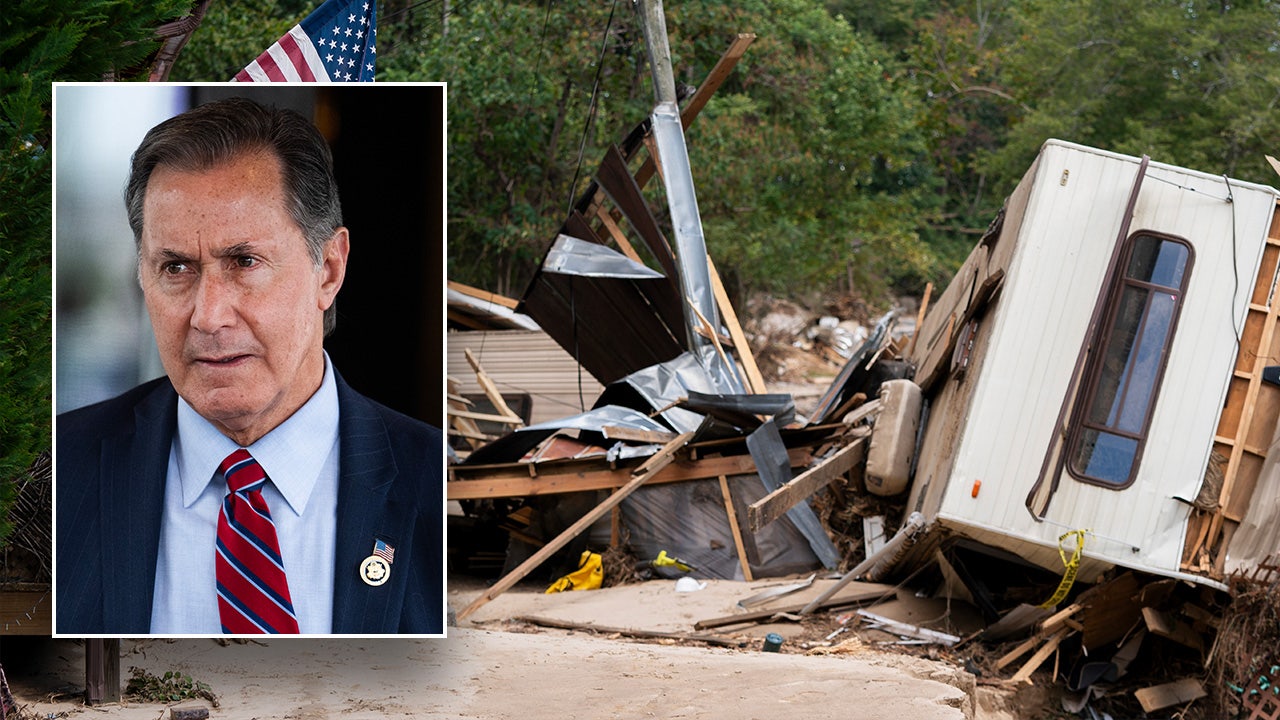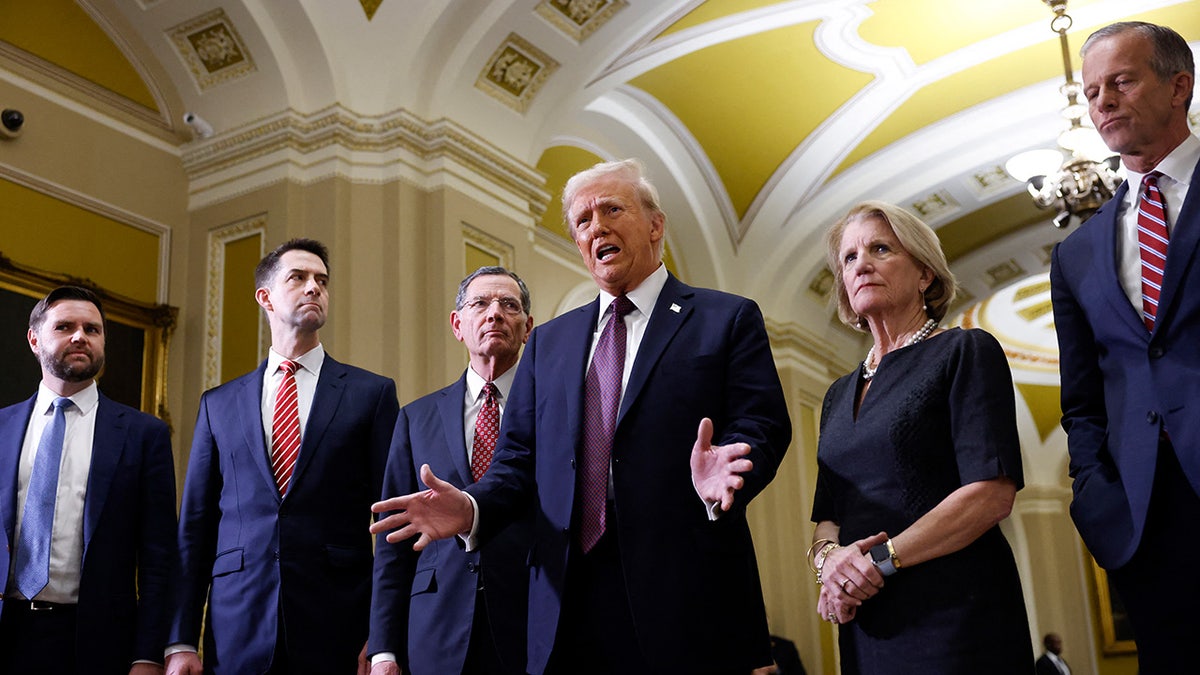Politics
House Republicans eye FEMA fund overhaul ahead of high-stakes hearing on Helene recovery

A group of House Republicans is pushing to overhaul how funds are organized at the Federal Emergency Management Agency (FEMA) to more quickly get aid to communities devastated by Hurricane Helene.
Rep. Gary Palmer, R-Ala., chair of the House GOP Policy Committee, is leading a new bill that would move unspent funds the agency has from the COVID-19 pandemic, as well as certain unspent funds earmarked for previous natural disasters like Hurricane Katrina, into the FEMA Disaster Relief Fund.
It comes just hours before the House Oversight Committee is set to hold a high-stakes hearing over accusations that FEMA aid was politicized, with FEMA Administrator Deanne Criswell expected to testify.
“Millions of Americans were impacted by devastating hurricanes, and many are still seeking assistance and aid from FEMA to this day. Reports have now surfaced that a FEMA official recently instructed relief workers to avoid homes displaying support for President Donald Trump,” House Oversight Committee Chair James Comer, R-Ky., said last week when announcing the hearing.
MIKE JOHNSON WINS REPUBLICAN SUPPORT TO BE HOUSE SPEAKER AGAIN AFTER TRUMP ENDORSEMENT
House GOP Policy Committee Chair Gary Palmer is out with a new proposal to reshuffle FEMA funds. (Getty Images)
“Not only are these actions by a FEMA employee completely unacceptable, but the committee remains deeply concerned that this is not an isolated incident at the agency.”
Palmer’s bill is backed by a wide spectrum of GOP lawmakers, from House Freedom Caucus members, like Reps. Anna Paulina Luna, R-Fla., and Byron Donalds, R-Fla., to more moderate Republicans, like Reps. Don Bacon, R-Neb., and Young Kim, R-Calif.
It’s one of several solutions proposed in Congress to help get more immediate dollars to FEMA’s disaster fund.
MATT GAETZ FACES GOP SENATE OPPOSITION AFTER TRUMP SELECTION FOR ATTORNEY GENERAL

Parts of North Carolina, like Chimney Rock, were hit hard by Helene. (Getty Images)
Criswell told reporters on Monday that her agency “will need additional funding of approximately $40 billion beyond its 2025 budget request to support the ongoing recovery efforts to these storms and meet our overall mission requirements through the end of the fiscal year.”
The White House also requested $98 billion in additional disaster relief funding from Congress.
Congressional leaders on both sides of the aisle have pledged to act swiftly once getting a formal request from the Biden administration.
JOHNSON BLASTS DEM ACCUSATIONS HE VOWED TO END OBAMACARE AS ‘DISHONEST’
Helene ravaged part of the U.S. Southeast in late September, killing more than 100 people in North Carolina alone.
It’s estimated to have caused billions of dollars worth of damage as well.
House Speaker Mike Johnson, R-La., previously told Fox News Digital that he believed it could be one of the most expensive storms in U.S. history.

Politics
Video: How Trump Could Justify His Immigration Crackdown

President-elect Donald Trump is likely to justify his plans to seal off the border with Mexico by citing a public health emergency from immigrants bringing disease into the United States. Now he just has to find one. New York Times White House Correspondent, Zolan Kanno-Youngs, explains.
Politics
Trump to be sentenced in New York criminal trial

President-elect Trump is expected to be sentenced Friday after being found guilty on charges of falsifying business records stemming from Manhattan District Attorney Alvin Bragg’s years-long investigation.
The president-elect is expected to attend his sentencing virtually, after fighting to block the process all the way up to the United States Supreme Court this week.
Judge Juan Merchan set Trump’s sentencing for Jan. 10—just ten days before he is set to be sworn in as the 47th President of the United States.
TRUMP FILES MOTION TO STAY ‘UNLAWFUL SENTENCING’ IN NEW YORK CASE
Merchan, though, said he will not sentence the president-elect to prison.
From left to right: Judge Juan Merchan, former President Donald Trump, and Manhattan District Attorney Alvin Bragg. (Getty Images, AP Images)
Merchan wrote in his decision that he is not likely to “impose any sentence of incarceration,” but rather a sentence of an “unconditional discharge,” which means there would be no punishment imposed.
Trump filed an appeal to block sentencing from moving forward with the New York State Court of Appeals. That court rejected his request.
Trump also filed an emergency motion with the U.S. Supreme Court, arguing that it “immediately order a stay of pending criminal proceedings in the Supreme Court of New York County, New York, pending the final resolution of President Trump’s interlocutory appeal raising questions of Presidential immunity, including in this Court if necessary.”
“The Court should also enter, if necessary, a temporary administrative stay while it considers this stay application,” Trump’s filing requested.

Manhattan District Attorney Alvin Bragg arrives at Daniel Penny’s trial following a lunch break at the Manhattan Supreme Criminal Court building in New York City on Monday, December 2, 2024. (Julia Bonavita/Fox News Digital)
TRUMP FILES EMERGENCY PETITION TO SUPREME COURT TO PREVENT SENTENCING IN NY V. TRUMP
Trump’s attorneys also argued that New York prosecutors erroneously admitted extensive evidence relating to official presidential acts during trial, ignoring the high court’s ruling on presidential immunity.
The Supreme Court denied Trump’s emergency petition to block his sentencing from taking place on Friday, Jan. 10.
The Supreme Court, earlier this year, ruled that presidents are immune from prosecution related to official presidential acts.
But New York prosecutors argued that the high court “lacks jurisdiction” over the case.

Trump has previously explained a strategic component to his one-bill reconciliation approach. (Getty Images)
They also argued that the evidence they presented in the trial last year concerned “unofficial conduct that is not subject to any immunity.”
Trump was charged with 34 counts of falsifying business records in the first degree. He pleaded not guilty to those charges. After a six-week-long, unprecedented trial for a former president and presidential candidate, a New York jury found the now-president-elect guilty on all counts.
Trump has maintained his innocence in the case and repeatedly railed against it as an example of “lawfare” promoted by Democrats in an effort to hurt his election efforts ahead of November.
Politics
Column: Trump shoots his mouth off as L.A. burns. His claims about fire hydrants don’t hold water

SACRAMENTO — OK, I admit it. I’m biased. I hate it when an opportunistic politician capitalizes on other people’s miseries and tries to score political points.
I’m especially biased when it’s a president-elect who shoots off his mouth without regard for facts and blames a governor for fire hydrants running dry.
Not that Democrat Gavin Newsom is a perfect governor. But his California water policies had no more to do with Pacific Palisades hydrants drying up during a firestorm than did Republican Donald Trump’s turning on sprinklers at his golf course.
News reporters shouldn’t allow personal biases to seep into their stories, as Los Angeles Times owner Patrick Soon-Shiong has reminded us. Reporters have long strived to not do so and mostly succeeded. But I’m not a reporter. I’m a columnist who analyzes and opines. And yes, I’m biased — but on issues, not politics.
It has always been my view that liberals, moderates and conservatives all have good and bad ideas. Neither party has a monopoly on truth and justice — except in relating to Trump.
I wanted to give Trump the benefit of the doubt and watch whether he really intended — as promised — to be a president for all Americans. But the guy just can’t help himself.
When Trump blamed Newsom for water hydrants going dry as Pacific Palisades burned, it wasn’t something people should dismiss as just another Trumpism.
Here was a president-elect mouthing off and showing his ignorance in a barrage of vindictiveness and insensitivity as thousands of people fled for their lives and hundreds of homes blazed into ashes.
Yes, I’m biased against anyone who’s that uncivil, especially when he disrespects facts or — worse — is a pathological liar.
So, let’s recap what Trump did.
As scores of hydrants went dry while fire crews battled flames in Pacific Palisades, the president-elect instinctively went on social media to point the finger at his left coast political adversary, the Democrat he tastelessly derides as Gov. “Newscum.”
“Governor Gavin Newscum refused to sign the water restoration declaration put before him that would have allowed millions of gallons of water from excess rain and snow melt from the north to flow daily into many parts of California, including the parts that are currently burning in a virtually apocalyptic way,” Trump asserted.
“He wanted to protect an essentially worthless fish called a smelt … but didn’t care about the people of California. Now the ultimate price is being paid.
“I will demand that this incompetent governor allow beautiful, clean, fresh water to flow into California. He is the blame for this. On top of it all, no water for fire hydrants, not firefighting planes. A true disaster.”
True drivel, putting it politely.
First, what was this so-called water restoration declaration?
“There’s no such document,” responded Izzy Gardon, Newsom’s communications director. “That is pure fiction.”
Trump probably was referring to his policy differences with Newsom on water exports from the Sacramento-San Joaquin River Delta to farmlands in the San Joaquin Valley. In his first presidency, Trump wanted to drain more fresh water from the delta for irrigation in the valley. But both Govs. Jerry Brown and Newsom took a more centrist approach, striving for a balance between farms and fish.
Second, it’s not the demise of the tiny smelt — the Republicans’ favorite target — that’s so concerning to many conservationists. It’s the rapid decline of iconic salmon that previously provided world-class recreational angling in the delta and fed a healthy commercial fishery on the coast. Salmon fishing seasons have been closed recently to save what’s left of the fish.
Third, despite Trump’s claptrap, plenty of fresh delta water is being pumped south to fill fire hydrants and the tanks of firefighting aircraft. Hundreds of millions of gallons of water flow daily down the California Aqueduct. Major Southland reservoirs are at historically high levels. Anyway, much of L.A.’s water doesn’t even come from the Delta. It flows from the Owens Valley and the Colorado River.
Fourth, the hydrants went dry simply because there were too many fires to fight, the Los Angeles Department of Water and Power explained. Storage tanks went dry.
“We pushed the system to the extreme,” Janisse Quinones, DWP chief executive and chief engineer, said. “Four times the normal demand was seen for 15 hours straight.”
Yes, I’m biased against politicians who make up stuff.
But you’ve got to listen to Trump because he could follow through on what he’s bellowing about.
For example, Trump vowed during the presidential campaign to deny Newsom federal money to fight wildfires unless the governor diverted more water to farms.
That apparently wasn’t an idle threat.
Trump initially refused to approve federal wildfire aid in 2018 until a staffer pointed out that Orange County, a beneficiary, was home to many voters who supported him, Politico reported. And in 2020, the Federal Emergency Management Agency rejected an aid request during several California wildfires until Republicans appealed to Trump.
So, what’s Trump going to be like when he actually becomes president again and is wielding real power, not just running off at the mouth?
Will he try to annex Greenland? Seize the Panama Canal? When a reporter asked him whether he’d commit to not using “military or economic coercion” to achieve these goals, he immediately answered: “No.”
Will he keep calling Canada our “51st state?”
Yep. I’m biased against such immature and dangerous political leaders.
-

 Business1 week ago
Business1 week agoThese are the top 7 issues facing the struggling restaurant industry in 2025
-

 Culture1 week ago
Culture1 week agoThe 25 worst losses in college football history, including Baylor’s 2024 entry at Colorado
-

 Sports1 week ago
Sports1 week agoThe top out-of-contract players available as free transfers: Kimmich, De Bruyne, Van Dijk…
-

 Politics1 week ago
Politics1 week agoNew Orleans attacker had 'remote detonator' for explosives in French Quarter, Biden says
-

 Politics1 week ago
Politics1 week agoCarter's judicial picks reshaped the federal bench across the country
-

 Politics6 days ago
Politics6 days agoWho Are the Recipients of the Presidential Medal of Freedom?
-

 Health5 days ago
Health5 days agoOzempic ‘microdosing’ is the new weight-loss trend: Should you try it?
-

 World1 week ago
World1 week agoIvory Coast says French troops to leave country after decades
:max_bytes(150000):strip_icc()/TAL-header-rollercoaster-silverwood-theme-park-idaho-IDTHEMEPARK1124-5ecadd31e5bb4205a804d3cc6895bdf8.jpg)











